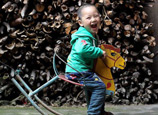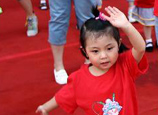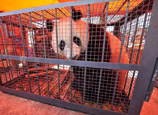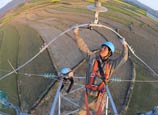
BEIJING, May 30 (Xinhua) -- At a Beijing primary school, the teacher shows her fourth-grade students a cartoon video. When it portrays a male adult grabbing the bottom of a little girl, all the boys in the class utter sounds of disgust and then burst into playful laughter.
The teacher pauses the video and asks of the nine and 10 year olds gathered before her, "What kind of trouble has the girl ran into?" A boy in a yellow-striped shirt stands up, saying, "Touching her private parts, it's very bad," then raising his voice, "It is behavior beyond description."
Such "behavior beyond description" has haunted China in recent months as a string of cases involving molestations of school kids has hit the headlines. It prompted China's Supreme People's Court to vow "zero tolerance" of such acts in a statement issued on Wednesday.
But with International Children's Day falling on Saturday, focus has also been placed on how to adequately educate kids about sexual issues.
The recent molestation cases have highlighted the importance of classes like the one attended by the little boy on Tuesday at An Hui Li Central Primary School in Chaoyang District (referred to as An Hui Li School hereafter). Their tragic details reveal children's ignorance about self protection due to poor sex education.
In some of the cases in the news, the victims were reportedly too afraid or ashamed to speak up, leaving molesters unrestrained for long periods after their acts.
However, in An Hui Li School's "sex education" class, students, both boys and girls, are encouraged to talk openly about sexual assaults and scramble to express their ideas regarding protection measures.
That is why this primary school in a leafy neighborhood adjacent to Beijing's Olympic Stadium has been cited as a trailblazer in breaking a Chinese taboo of educating youngsters about sex.
"We should say NO to sexual assault loudly," a student writes on a feedback sheet after the class, spelling 'No' in capitalized English letters.
For her and many of her peers, the notion of sexual assault was a foreign one before the class, according to a questionnaire they were asked to fill in. Two students answered that their only knowledge of sexual assault was that it was "perverted behavior."
During the class, a boy volunteers to narrate his encounter with what he believed was a sexual assault. "The other day, I saw a woman in a man's arms, making very intimate moves, and I felt gross," he explains.
The teacher, Zhang Xinzhu, a 23-year-old psychology graduate, says, "Oh, dear, I feel much relieved after you told me that was your experience with sexual assault."
She then tells the 40-student class that sexual assault is dangerous, unacceptable behavior that makes one uncomfortable, including physical and verbal assaults, among other forms.
To be more specific, Zhang says, "When you put on a swimming suit, the parts of your body covered are 'private.' Never allow anyone to touch them."
The An Hui Li School has been running sex education classes since 2010,offering one or two 40-minute sessions to students of each grade annually. Their contents range from physical differences between boys and girls, how to prevent against sexual assaults, mood sexual management and birth.
Sex education among young children remains controversial in China, with many fearing that it will render kids precocious.
Besides, sex itself, historically considered taboo in confucianist culture and in the era before China's reform and opening-up from the late 1970s, still casts a pall on today's society. People often blush when sex is publicly mentioned.
As a result, parents even stonewall their children's inquiries about sex-related topics.
For instance, "Where do I come from" is a question bewildering generations of Chinese children, as the most probable answer they get from adults is a half-joking reply, "We picked you up at a garbage dump."
A fifth-grade girl, Ling Ling (pseudonym) of An Hui Li School, said when she asked her mother what is the phrase to describe births other than caesarean, her mother answered, "You will know when you grow up."
"When I was little, I always wondered where I came from. Did I fall from the sky? Was I fished from a garbage dump? Or a fairy turned into a human?" Ling said, placing her right index finger against her cheek.
Now, as a recipient of sex education from first grade and a participant in a guided tour of the school's boys' rooms as part of the class, she knows babies are conceived by "the combination of sperms and eggs, and delivered through mothers' vaginas."
Zheng Ju, vice principal of An Hui Li School, also one of the curriculum designers, believes quelling young kids' innocent curiosity is harmless and good for shaping their view of sex as something natural.
On the other hand, "evading the topic will only arouse their greater curiosity and convey a message that sex is indeed mysterious and sensitive," she says. "Besides, even if adults keep silent, children may as well learn from other sources."
She also insists on including teaching on sexual assaults prevention in the curriculum, explaining, "This is not something that can be fixed after it happens. Such knowledge is as important as earthquake survival skills."
Hao Xinying, a 36-year-old housewife and mother of a fifth-grader at An Hui Li School, said, "I am too shy to talk about this stuff with my girl, and I feel relieved the school does the job. I hope they learn this knowledge as early as possible."
In the recent child molestation cases, a 42-year-old second-grade teacher in the southern city of Shenzhen was detained on Monday under suspicion of molesting female pupils.
And a 55-year-old teacher of central China's Henan Province was arrested on May 23 for allegedly molesting multiple female students.
On May 14, a primary school headmaster and a government employee in Wanning City, Hainan Province, were also detained by police for allegedly sexually assaulting six female students.
















 A 62-year-old man was killed by two dogs
A 62-year-old man was killed by two dogs


![]()
